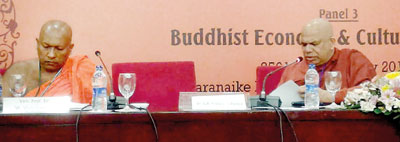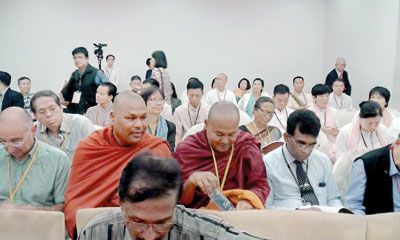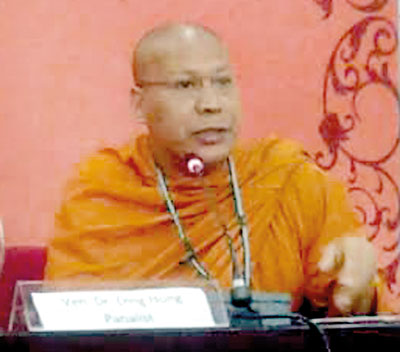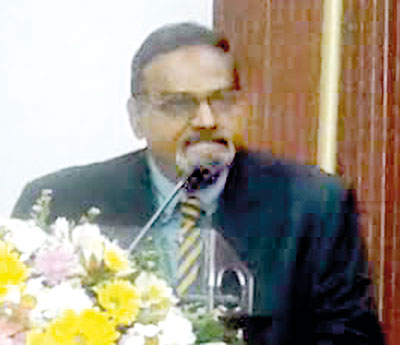News
Capitalising on Buddhist cultural tourism
With more Westerners attracted to Buddhism and an increasing number of retirees capable and willing to travel, this could be the right time to promote religious tourism in the country, panel speakers point out on second day of symposium

Ven. Nambirittankadawara Gnanaratana Thera and Ven. Dr. Tampalawela Dhammaratana Thera moderating the session
The potential for Buddhist countries to promote cultural tourism at a time when Asia is fast becoming a global economic power was among the highlights of the discussion held on the second day of the United Nations International Day of Vesak conference at the BMICH yesterday.
âWe are now living in the Asian Century with Asia becoming the global economic power house,â remarked Ven. Prof. Wijithapura Wimalaratana Thera, Head – Department of Economics, University of Colombo and Vice President – Sri Lanka Economic Association, setting the tone for the panel discussion on âBuddhist Economy and Cultural Tourismâ of the Research Symposium on Buddhist Teachings for Social Justice and Sustainable World Peace.
The symposium, which was part of the UN International Day of Vesak celebrations, drew a large number of renowned scholars – both local and foreign.
Cultural tourism, Wimalaratana Thera explained citing UNWTO 2001, is three-pronged: cultural traces, cultural heritage and cultural tourism products. The converting of cultural traces and cultural heritage into tourism products are considered cultural tourism products. âBuddhism has a long history compared to many other religions in the world, and its roots go back some 2600 years; a fact which attracts modern culture tourism to Buddhism.â The well-researched presentation fusing global statistics with Buddhist canon brought under the spotlight the potential for Buddhist countries to promote cultural tourism. These countries boast of major Buddhist culture tourism products such as pilgrimages to holy places, historic cities, Buddhist compounds, Buddhist festivals, regional culture and cultural events, religious practices, Buddhist arts, crafts and architecture, Buddhist educational centres and Buddhist rural and urban lifestyles, pointed out the prelate.
Fundamentals propagated by Buddhism such as democracy, religious freedom and harmony, social equity and peaceful co-existence, also hold great appeal to the âeducated and balanced-mindedâ non-Buddhist communities to explore Buddhism, said the prelate, adding that this was a bonus for promoting Buddhist cultural tourism. Technology, which has now transcended national boundaries, together with fast-growing, low-cost transport and communication facilities further contributed to this purpose noted Wimalaratana Thera.

A section of the audience
The Buddhist scholar also cited the rapidly expanding ageing population as a factor boosting Buddhist cultural tourism. âThe lifetime savings as well as purchasing power of elderly people are high, and they are willing to visit religious and cultural destinations including Buddhist cultural locations. This is an opportunity to promote Buddhist cultural tourism.â
Dr. Prashanta Perera, former General Manager – Jetwing Eco Holidays pointed out that the knowledge of the capacity of a tank or the height of a stupa was not what a modern cultural tourist expects of their tour guide, but insights into the teachings of the religious philosophies which have shaped the cultures they were exploring. In a stimulating presentation on âCultural Tourism and Religionâ, the senior professional with his wealth of experience at the Central Cultural Fund, and several universities and institutes of higher education, noted that âspiritual tourismâ which started off at a snail’s pace, was now gathering momentum with more westerners applying for long- and short-term programmes conducted at reputed institutions in Sri Lanka and India on a regular basis. âThe concept of spiritual tourism further encourages participative tourism and rural tourism which provides wide opportunities to enlighten on the intangible cultural component of a society which could only be understood by living as a member of the society concerned.â
Dr. Perera pointed out that we, as a country, are now analysing âin a big wayâ how the intangible cultural component of the country could be presented to tourists in a meaningful way, âas it may disclose the collective thinking of society on many affairs.â The mental happiness advocated by eastern religions also propel westerners to exploit cultural tourism and re-analyse the true gains of materialism and pleasure travels which they were concerned with in the past, he added.
Ven. Dr. Anil Sakya, Acting Rector – World Buddhist University, and Senior Lecturer in Anthropology, Faculty of Social Sciences, Mahamakut Buddhist University, maintained that despite âBuddhist Economicsâ becoming âa catchy phraseâ in the past six decades, Buddhist instructions to deal with economics are aligned with the ânoble way of livingâ rather than a âhard core economic scienceâ. âIt is more on economics of happiness rather than general economics,â observed the Buddhist monk in his discourse on âBuddhist Economics and Cultural Tourismâ.
âThe Buddhist Solution to the Happiness-Income Paradoxâ by Ven. Dr. Ding Hong, from Hong Kong, âPackaging Buddhism for Tourism: Interplay between Economy, Culture, Community and Dhammaâ by Dr. Puay Liu Ong from the National University of Malaysia, âBuddhist Economics of Happiness: A New Paradigmâ by Dr. Soontaraporn Techapalokul, and âBuddhist Economy and Cultural Tourismâ by Dr. Sean Thompson from Colorado, USA also initiated refreshing dialogues at the panel discussion. The session was moderated by Ven. Dr. Tampalawela Dhammaratana Thera, the Consultant and the Director of Buddhist Links at the UNESCO Headquarters in Paris and Ven. Prof. Nambirittankadawara Gnanaratana Thera, the Chief Incumbent of the Vanasingha Rajamaha Viharaya and the Director General of Pirivena Education at the Ministry of Education.

Ven. Dr. Anil Sakya

Dr. Prashantha Perera

Ven. Prof. Wijithapura Wimalaratana Thera

